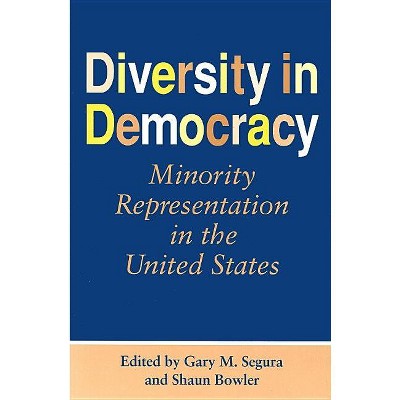Legacies of the 1964 Civil Rights ACT - (Race, Ethnicity, and Politics) by Bernard Grofman (Paperback)

About this item
Highlights
- The 1964 Civil Rights Act, in conjunction with the Voting Rights Act of the following year, totally transformed the shape of American race relations.
- About the Author: Bernard Grofman, Professor of Political Science and Social Psychology at the University of California, Irvine, is the author or editor of numerous books on voting equality.
- 320 Pages
- Political Science, Civil Rights
- Series Name: Race, Ethnicity, and Politics
Description
About the Book
Contributors: Paul Burstein, University of WashingtonDavid B. Filvaroff, State University of New York, BuffaloLouis Ricardo Fraga, Stanford UniversityHugh Davis Graham, Vanderbilt UniversityJack Greenberg, Columbia UniversityGloria J. Hampton, Ohio State UniversityJoseph B. Kadane, Carnegie Mellon UniversityRandall Kennedy, Harvard Law SchoolJ. Morgan Kousser, California Institute of TechnologyRichard Lempert, University of MichiganPaula D. McCain, University of VirginiaCaroline Mitchell, Esq., Pittsburgh, PennsylvaniaGary Orfield, Harvard UniversityJorge Ruiz-de-Velasco, Stanford UniversityBarbara Phillips Sullivan, Ford FoundationKatherine Tate, University of California, IrvineStephen L. Wasby, State University of New York, AlbanyRobin M. Williams Jr., Cornell UniversityRaymond E. Wolfinger, University of California, Berkeley
Book Synopsis
The 1964 Civil Rights Act, in conjunction with the Voting Rights Act of the following year, totally transformed the shape of American race relations. Supporters of the Civil Rights Act sought, at minimum, the elimination of racial segregation in publicly supported schools, hospitals, public transport, and other public spaces, and an end to open and blatant racial discrimination in employment practices.
Judged in those terms, the act is a remarkable success story. It has shown the power of the central government to change deeply entrenched patterns of behavior. In terms of the law, blacks are no longer second-class citizens. From other perspectives, however, the act is seen as a failure. Either it went too far, by institutionalizing race-specific forms of preferences, or it did not go far enough, leaving untouched the socioeconomic differences and lingering effects of past discrimination that perpetuate race-based inequities.
Legacies of the 1964 Civil Rights Act brings together a distinguished group of political scientists, historians, lawyers, statisticians, and sociologists who have written extensively on civil rights issues. The editor, Bernard Grofman, has asked the contributors to stand back from the immediate controversies about civil rights reflected in today's news and to provide historical and comparative perspective about this important legislation. Organized into four sections, the book covers the origins of the act and its historical evolution, its consequences in several different policy domains, and the future of civil rights in the United States. An appendix contains two somewhat more technical essays on legal standards for statutory violations and statistical issues in measuring discrimination.
Because the moral urgency of the Civil Rights Act of 1964 was triggered by revulsion against racial segregation, the act's legacy is primarily seen in the life chances of African Americans. This volume provides a broad and detailed picture of the act's impact on African Americans' lives.
About the Author
Bernard Grofman, Professor of Political Science and Social Psychology at the University of California, Irvine, is the author or editor of numerous books on voting equality.











